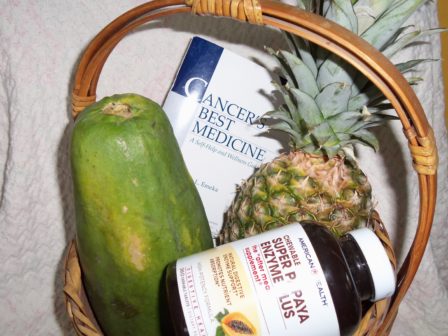The Power of Peer Education
I work with peer health educators on a regular basis. Since I have developed a deep respect for their ability to communicate both concisely and effectively about health issues, I was delighted to find a book about cancer that was written by “the common man” and not a medical expert. The brief booklet, not even a hundred pages, called “Cancer’s Best Medicine” was written by Mauris Emeka, a professional AMTRAK attendant. His knowledge of cancer was hard-earned while researching and looking for practical application of therapies to address his wife’s illness. He offers his insights and resources as a way to guide others in finding options. I found his explanation of cancer to be the most compelling that I have ever read.
Mauris Emeka begins his booklet by identifying cancer, any kind of cancer, as a symptom of a deeper, long term dysfunction of a body system. The dysfunction that he finds is most common is that of the pancreas. The pancreas is a complex organ that is part of the endocrine system; it secretes the hormone insulin in response to rising levels of blood sugar, it stimulates white blood cell immune function to address toxins and foreign proteins coming into our bodies, and it supports digestion by providing digestive enzymes to our stomach to break down food substances.
It is this last function that requires our attention, since excessive need for digestive enzymes will naturally reduce the ability of the pancreas to produce insulin and stimulate the immune system. Short term, this is not a problem; long term, this disrupts the blood sugar levels and results in diabetes, as well as leaving us vulnerable to infection and allergic reactions and allows aberrant cancer cells to flourish instead of being safely dismantled by white blood cells. When we eat meals that are predominantly cooked and processed foods, all of the naturally occurring enzymes are “denatured” by heat. Think of an egg white turning solid and you can get some idea of what heating does to the protein of enzymes. In their raw form, enzymes provide exactly the catalyst needed to digest the food that contains them. That same food, when cooked or pasteurized, will not spoil due to a lack of enzymes; it also won’t digest without some help from the pancreas. When you hear that you need to eat “more fresh fruits and vegetables,” this means to consume the food in raw form. If you can alter your daily diet to consist of 50-80 percent raw foods, you relieve the demand on the pancreas and allow it to do its job.
Fifty years ago, cancer affected one in thirty people. Today the incidence of cancer is more like one in three. The difference has been in lifestyle. Our food supply is one of the major changes in our lifestyle. With this one simple recommendation for eating habits, we can do a lot to prevent cancer and support healing from its symptoms. Obviously, raw food is NOT the “miracle cure” for cancer. It is, however, a readily understandable and achievable therapy that we can do at home to improve our risk factors.
The booklet can be previewed and ordered at Mauris Emeka’s website at www.cancernomore.com, or by calling Apollo Publishing at 818-422-3912. It comes in traditional paper format or can be downloaded directly to your computer. I liked it so much that I ordered a dozen copies to share with friends. It is a way that I can easily provide them with a quick, non-technical guide to preventing and addressing cancer. After all, this will be a big concern for a third of the people that I know. And it will be an issue for a third of the people that they know. We can support each other in making small changes in lifestyle that add up to big advantages in our health. Go raw! Join me in a vegie juice toast to Mauris.
Category: Health & Fitness, Life Style








